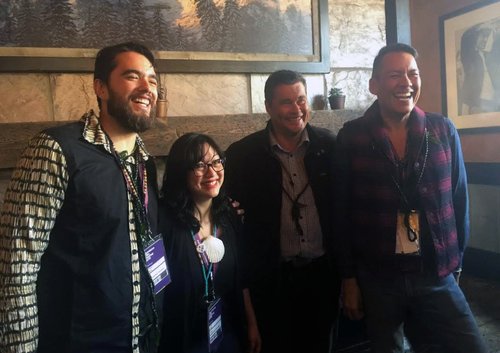
By Heperi Mita (Ngā Taonga Sound & Vision)
Heperi Mita has worked for Ngā Taonga Sound & Vision on and off for the past five years. In January he was invited to the Sundance Film Festival to represent his mother, pioneering Māori filmmaker Merata Mita, at the unveiling of the Sundance Institute’s Merata Mita Fellowship. He is currently working on a documentary about her life. He tells us about the fellowship and his trip to Utah in today’s post.
It was minus 17 degrees Celsius at daybreak and small parties of workers had taken to the streets to clear the snowfall of the past 48 hours. My brother Rafer and I arrived from a balmy New Zealand summer – and had yet to adjust to the 20 hour time difference between home and Park City, Utah. Only a few weeks prior we received an invitation from Bird Runningwater (Cheyenne / Mescalero Apache), director of the Sundance Institute’s Native American and Indigenous Film Program, to attend the Sundance Film Festival, and now here we were waiting for a car to take us to Robert Redford’s Zoom restaurant, where the announcement of the inaugural Merata Mita Fellowship would take place. Our mother passed away six years ago, yet she was still taking us to far-flung reaches of the earth.
In Aotearoa she is remembered for her activism, documentaries and films of the 1980s, but she also spent ten years as an advisor and artistic director at the Sundance Institute NativeLab, up until her death in 2010. We didn’t know exactly what she did during those trips to the US – I was too young to fully comprehend what she was doing, while Rafer was mature enough to be managing his own life and responsibilities. What we did know was that she was spending a lot of time with Bird, who became like a whāngai brother to us.
The Merata Mita Fellowship is a continuation of her work for Sundance. It is open to Indigenous filmmakers around the world working on feature length films (both documentary or dramatic). Recipients receive a monetary grant, a trip to the festival and access to strategic and creative support programmes offered by the Sundance Institute.
The day before, we had boarded a bus into Park City and heard someone shout out: “Hepi is that you?” The voice belonged to a Kanaka Maoli (Native Hawaiian) filmmaker whom our mother had helped introduce to the Sundance Native Lab. He didn’t recognise me at first as it had been seven years since we had last met, but he saw the resemblance to our mother in my brother and took a chance. This was just the first of many reunions and meetings with people from our mother’s past, which reoccurred throughout our time there. It was eye-opening to see the sheer number of indigenous filmmakers from around the world, who expressed their respect and appreciation for the help and guidance our mother had given them over the years. Although her work at the Institute was not as visible as her filmmaking, the enduring impact it has left was evident.
This fact was reinforced by the range of international organisations who supported the fellowship. Organisations such as Indigenous Media Initiatives, the Embassy of Australia, and Pacific Islanders in Communication have all made ongoing commitments to support the Merata Mita Fellowship. Aotearoa was represented by private donations from Taika Waititi and Cliff Curtis.
It was fitting that the first ever recipient of the fellowship was a Kanaka Maoli wahine, Ciara Lacy, who is currently finishing her documentary, Out of State. Out of State follows Hawaiian inmates who reconnect with their kūpuna (tūpuna) in the most unlikely place: a private prison in the Arizona desert. It’s a film about the challenges they face finding a place for themselves in mainstream society. It’s the kind of hard-hitting, social examination our mother would be proud of.
Hero Image: The Sundance Film Festival - Heperi Mita, Ciara Lacy, Rafer Rautjoki and Bird Runningwater. (Photo - Christopher Kwock.